Opinion
Lawyers’ Collective calls on govt., all political parties to commit to repeal of PTA
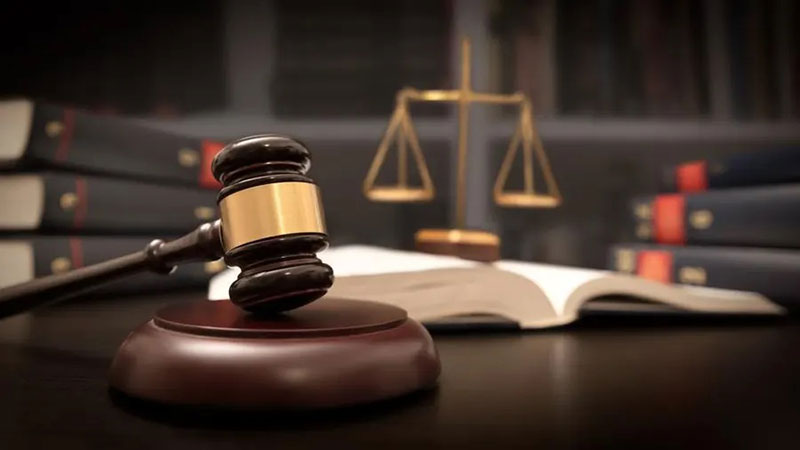
On 29 October 2024, the Director-General (Legal) at the Presidential Secretariat, Attorney at Law J M Wijebandara, representing the government stated that the issue was not the PTA’s existence as our law, but rather its misuse to detain civil activists, journalists, and others. He stated that the Government would not allow such misuse and that the PTA would only be applied based on “credible intelligence information, and it will not be used for political revenge”. On the same day, Cabinet Spokesman Minister Vijitha Herath stated: “There is a discussion on abolishing the PTA. We can only talk about changing the Act when the new Parliament is elected.” The Lawyers’ Collective expresses its grave concern regarding statements indicating that the PTA will be retained.
The National People’s Power (NPP), in its Election Manifesto of August 2024, commits to the “Abolition of all oppressive acts including the Prevention of Terrorism Act (PTA) and ensuring civil rights of people in all parts of the country” (p.129). During the recent presidential election campaign, and even before, the NPP actively advocated against the PTA and the abuse of its powers and has also opposed new laws that are similarly oppressive. It is of serious concern therefore, that after the people endorsed a mandate to repeal the PTA at the recent Presidential elections, the recent statements of the NPP government undermine the commitment made to the people.
The PTA, enacted in 1979, is well known as a draconian piece of legislation with broad emergency-like executive powers, but enacted for use in ordinary times as well. The provisions and scheme of the PTA fail to protect fundamental rights such as freedom from arbitrary arrest, freedom from torture and freedom of expression. The PTA, as implemented by successive governments since its enactment, has caused unmeasurable human suffering in the form of torture, long-term detentions and instilling fear in minorities and those critiquing the government. The PTA has a record of being used as a weapon and continue to be used against any citizen with impunity. The call for its repeal has been resounding from within the country as well as internationally. There has been wide support for its repeal by political parties in recent years, but successive governments have continued to retain it after taking office.
President Anura Kumara Dissanayake must honour the commitment to repeal the PTA. The statement made on behalf of the government by Director General (Legal), Presidential Secretariat, J M Wijebandara must be unequivocally clarified, and a clear commitment to repealing the PTA be made public. This clarity and leadership are necessary to build public confidence that the government stands for the repeal of the PTA.
The Lawyers’ Collective also calls on all political parties to commit to multi-partisan support in the next Parliament to repeal the PTA. Parties must commit to ensure that Sri Lanka’s counter-terrorism legal framework complies with human rights safeguards. If emergency measures are needed in a given situation, all emergency powers must be strictly confined to periods of a declared state of emergency. These measures will strengthen the rule of law, democracy and human rights in the country and in turn, boost confidence in governance.
On behalf of the Lawyers’ Collective
Upul Jayasuriya, President’s Counsel
Dr. Jayampathy Wickramaratne, President’s Counsel
Professor Savitri Goonesekere, Attorney-at-Law
Geoffrey Alagaratnam, President’s Counsel
M.A. Sumanthiran, President’s Counsel
Saliya Pieris, President’s Counsel
M.M. Zuhair, President’s Counsel
S.T. Jayanaga, President’s Counsel
Professor Deepika Udagama
Professor Camena Gunaratne
Rev. Fr. Noel Dias, Attorney-at-Law
Srinath Perera, Attorney-at-law
Ermiza Tegal, Attorney-at-Law
Sandamal Rajapakse, Attorney-at-Law
Manoj Nanayakkara, Attorney-at-Law
Amila Egodamahawatte, Attorney-at-Law
Jayantha Dehiaththage,Attorney-at-Law
Opinion
The path of gifted child

by R N A de Silva
rnades@gmail.com
We often speak about the students who are struggling in mathematics classes with the hope of finding corrective measures to remedy the situation. But rarely we consider what needs to be done to help gifted students. Even in teacher forums and parent-teacher meetings the discussions are directed towards students who have difficulties in mathematics. Perhaps this is due to the fact that those who struggle with mathematical problem solving are in a majority group. But, is it fair to forget about the needs of gifted children although they may be only a handful in number?
Most educational settings do not adequately address the needs of gifted students due to the difficulties to administer a specialised programme as it involves structural changes in a rigidly followed curriculum. Ultimately it is left to the teacher to identify such students and to provide accelerated learning situations and enrichment activities within a regular classroom setting. This causes a problem as some teachers may not have the required knowledge and capability to handle the situation successfully.
A gifted child is defined as ‘a child who is naturally endowed with a high degree of mental ability in a specific sphere of activity or knowledge’. Identification of a gifted child cannot happen solely on high achievement levels. If a child scores very high on a particular test it maybe that the test was not of appropriate difficulty. Therefore, the score may not indicate the true level of understanding. In such a situation it may be necessary to administer an assessment of a higher standard. In addition, general performance, teacher observations and social & emotional behavioural patterns have to be looked at for a formal evaluation. The common characteristics of a gifted child include ability to comprehend material several grades above their age level, strong sense of curiosity, creative problem solving and imaginative expression and absorbing information quickly with few or no repetitions.
Mathematically gifted students are often able to work out solutions with unusual speed and accuracy. They are able to see relationships and connections without formal instruction. As such, they may show signs of boredom and disinterest when the teacher tries to demonstrate the steps required to obtain the correct answer in detail. They usually are more interested in finding out how a formula is formed and why it is done in a particular way rather than the computational processes involved with the formula. Further, these children prefer to learn all they can about the concept introduced before moving on to the next topic perhaps creating difficulties for the teacher who has to consider time constraints and schedule structure.
For a teacher, managing a range of academic levels within a classroom is a formidable task. If the gifted learners are underchallenged or unstimulated, there can be a discrepancy between how these children prefer to learn and how they are taught. As a result, there can be behavioural problems, confidence breakdown and even peer relationship clashes. As an example, Steve Jobs, the founder of Apple technology had difficulty functioning in a traditional classroom, frequently misbehaved and was suspended a few times, perhaps because his brilliant mind was not challenged sufficiently during classes. On the other hand Carl F. Gauss, the renowned German mathematician was identified by his teachers as a person with extraordinary mathematical skills and sent to a specialised mathematical academy for further study. Similarly, the Indian mathematical prodigy Ramanujan was identified as a mathematical genius by Professor Hardy of the University of Cambridge, and because of that Ramanujan was able to contribute so much towards mathematical analysis and number theory. Professor Hardy is a genius in recognising a genius and if not for him we may never have heard of a Ramanujan.
An annoyance that teachers experience is when gifted children obtain solutions to given problems through non-traditional methods or when their questions go far beyond the scope of the stated content in the syllabus. These students may have the ability to analyse mathematical situations correctly and obtain solutions to problems faster than their teachers. Capable teachers may use a different instructional approach in such situations adapting their teaching strategies to accommodate the needs of such students. Inexperienced teachers may give further exercises to these students not realising that what they need is not ‘quantity’ but ‘quality’.
In a nurturing learning environment, an atmosphere of mutual respect and appreciation is created between students and teachers. All students should feel valued. If some of them show capabilities ahead of their age, the educators have a responsibility to strengthen these talents so that they can develop their potential to the fullest. There are three ways of educating children who are intellectually and academically more advanced than their peers.
Acceleration – The gifted child is allowed to learn material at a more rapid pace. Intellectually gifted children, too, may have learning disabilities. They may be gifted in one area and not in another. Help students immerse themselves in a subject that sparks their passion. Self-directed learning is a skill that can be developed with all students but more so with gifted children.
Enrichment – The child works through the usual pace but supplemented with diverse activities and explorations. Students’ curiosity needs to be respected and encouraged. Space for deeper exploration and understanding can be provided through enrichment activities.
Differentiation – Both acceleration and enrichment described above are carried out within the regular classroom setting.
Teachers will be able to set more realistic expectations within a classroom setting if they are sensitive of the unique characteristics of mathematically gifted children. In order to accept the divergent thinking abilities of the gifted students, teachers have to be confident of their knowledge and teaching ability. If the students arrive at the correct solutions through unusual but creative methods, the teachers should acknowledge and reward them appropriately. Once the giftedness is identified, teachers could adapt the content and alter the pace of content acquisition giving room for more open-ended problems. The following are a few suggestions for parents and teachers when dealing with gifted children.
Provide opportunities to express their feelings
Giftedness is closely associated with sensitivity. As they often experience intense emotions, if not managed, it can result in disruptive behaviour. It is important to set aside some time preferably on a daily basis for them to share their concerns with parents. Listen to what they have to say without any dismissive comments.
Do not compare them with other children
Very intelligent children usually are self-critical. Encourage them to strive for success without being competitive. Show them that they have your support to reach their goals.
Do not place undue emphasis on grades.
Praise their strengths and at the same time indicating that nobody can be good at everything that they do. Discuss manageable strategies to strengthen areas of weakness. Unnecessary anxiety may creep in if the emphasis is placed on grades.
Support their involvement in extra-curricular and social activities.
Gifted children have a tendency to lead very busy lives. Help them to select realistic commitments covering a range of activities including their passionate interests, making sure that there is time to play, socialise and relaxation. Creative hobbies, too, can serve as a valuable tool to bring out their imaginative power.
As Ellen Winner quoted “Every child deserves a chance to succeed, but gifted children need it more urgently”.
The author is an educational consultant at the Overseas School of Colombo and a senior examiner of the International Baccalaureate Organization in UK.
Opinion
Devolution and Comrade Anura

By Austin Fernando
(Former Secretary to the President)
About ten months ago, among other things, I informally discussed the devolution of power with Anura Kumara Dissanayake, who was an MP at the time. The consequences of his low-priority approach to devolution, as predicted then, were reflected in the presidential election results in the North and the East. Perhaps, there were other reasons also for the low level of popular support for him over there. Now that he is the President of 23 million Sri Lankans, he must consider the presidential election results in the North and the East as a guide. Probably, the Indian External Affairs Minister Subrahmanyam Jaishankar has already reminded him of that.
Sri Lankan politicians’ mood changes
The policies of Sri Lankan politicians on power sharing are characterized by inconsistencies. Former Ministers Basil Rajapaksa and Prof. G.L. Peiris promised Indians the implementation of the 13th Amendment (13A). Though Namal Rajapaksa has specifically rejected the devolution of Land and Police powers, President Mahinda Rajapaksa promised “13A+,” including those. In Delhi, President Gotabaya Rajapaksa said 13A could not be implemented “against the wishes and feelings of the majority (Sinhala) community.” But he had solemnly declared that he would uphold and defend the Constitution, of which 13A is an integral part! The Indian political leaders’ policy on the devolution here has remained consistent.
We have conveniently forgotten that during the Oslo Peace Talks on 05 December 2002, the Sri Lankan delegation led by G. L. Peiris and the LTTE delegation led by Anton Balasingham agreed to “explore a solution founded on the principle of internal self-determination in areas of historical habitation of the Tamil-speaking peoples, based on a federal structure, within a united Sri Lanka.”
“Federal,” “areas of historical habitation,” and “internal self-determination” are anathema to many Southern politicians and not understood by civilians. Today, Ranil Wickremesinghe and Pieris will certainly dissociate themselves from the Oslo Declaration.
Wickremesinghe, who supported the passage of 13A and appurtenant legislations, was Prime.
Minister (PM) when the Oslo Declaration was made. But now he is unwilling to devolve police powers to Provincial Councils (PCs). Gotabhaya Rajapaksa informed Indians that he must “look at weaknesses and strengths of 13A.” Had he said so as an inexperienced President in 2019, it would have been tolerable, but he said so after 22 months in office. It reflected a lack of knowledge of governance systems on his part or something up his sleeve.
Evolution of 13A
In this background, it is appropriate, to reflect the evolution of 13A to evaluate it as against what was demanded in the name of devolution.
Sri Lanka came under pressure to devolve power following Black July (1983) and the beginning of the armed conflict. The contention that the Indians wished for Sri Lanka’s division through devolution is not true. India has always respected our sovereignty and territorial integrity owing to its experience with conflicts in Mizoram, Nagaland, etc.
On 01 March 1985, President J. R. Jayewardene personally sought Indian Prime Minister Rajiv Gandhi’s intervention to prevent the movement of armed terrorists from India and Sri Lankans seeking refuge in India. On 01 December 1985, the Tamil United Liberation Front (TULF) presented its proposals for devolution to Gandhi in a bid to pressure Sri Lanka to agree to power-sharing.
The salient features of the proposal were as follows:
• Sri Lanka—”Ilankai” be a union of states,
• Amalgamated Northern and Eastern Provinces, a ‘Tamil Linguistic State’, which cannot be altered without their consent,
• Parliament reflecting ethnic proportion shall be empowered to make laws under “List 1″ for Defense, Foreign Affairs, Currency, Posts / Telecommunications, Immigration/Emigration, Foreign trade/Commerce, Railways, Airports /Aviation, Broadcasting/Television, Customs, Elections, and Census only, • List 2” had all other subjects, inclusive of Law and Order, Land, etc., with the State Assembly possessing law-making powers, • Any person resident in Sri Lanka, on 1st November 1981, who is not a foreigner shall be a Sri ankan citizen, • No Resolution or Bill affecting any “nationality” should be passed by Parliament without the agreement of that “nationality,” (The term ‘nationality’ is misleading.)
• The State Assembly to be empowered to levy taxes, cess/fees, and mobilize loans/grants,
• Special provisions for Indian Tamils,
• The elected members are to be given enhanced powers, • Upgrading the judicial system, e.g. Provincial High Court to Appeal Court, and, • Muslim rights to be cared for.
The Jayewardene Government rejected the proposal out of hand. The TULF again addressed Gandhi (17-1-1986), incorporating more sensitive issues such as ‘traditional homelands,’ demographic imbalance, etc. Jayewardene steadfastly advocated a military solution and the war was dubbed as “genocide” by former Indian Minister B.R. Bhagat and several Lok Sabha members. The latter demanded punitive interventions such as ‘crushing Sri Lanka in 24 hours” (Sri Kolandaivelu on 29-4-1985), and Sri Gopalaswamy on 13-5-1985, asking India “to undertake every possible means, including military interventions.”
Gandhi would have been satisfied with the Sri Lankan proposals of 09 July 1986, prepared after consulting Minister P. Chidambaram, which fitted the Sri Lankan constitutional basics. There were ‘Notes’ incorporated into the proposals on PCs, law and order, and land settlements inclusive of land alienation under the Mahaweli Project, with allottees identified based on ethnicity. On 30 Sept.,
1986, the TULF responded to India in detail to the government’s proposals, adding more propositions.
Gandhi was mindful of Lok Sabha’s demands. He vented frustration in Lok Sabha and abroad (e.g. Harare). Efforts to project him and India as weak exasperated him and drove him to get tough. On 02 June 1987, he threatened to send a flotilla with ‘humanitarian assistance’, and on 04 June 1987, Indian Aircraft violated Sri Lanka’s airspace and carried out aid drops in the North. No superpower stood with us on this blatant violation. No wonder Jayewardene agreed to sign an Accord and follow up by introducing 13A.
After the signing of the Accord, the Indian Peace Keeping Forces (IPKF) were deployed in Sri Lanka.
Lt. General A. S. Kalkat, in an interview with Nithin Ghokle, has admitted that the deployment of the Indian army here was a mistake. Jaishankar (one-time political adviser to the IPKF- 1988-1990), has said in his ‘The India Way,’ that it was a ‘misadventure.’ We are aware of the IPKF’s ‘mistakes’ and ‘misadventures’ like the Valvettithurai Massacre of 64 persons on 02 August 1989, and more, best known to Kalkat and Jaishankar. Importantly, the IPKF operations instilled fear, especially conditioning Tamil people’s minds to search for whatever possible solution.
Concurrently, as explained by then-Indian Foreign Secretary A. P. Venkateswaran, Jayewardene met Gandhi in mid-November 1986 in Bangalore, along with Ministers Natwar Singh, Chidambaram, and himself, and Jayewardene allegedly ‘pleaded’ with Gandhi to send the Indian Army to prevent his government from collapsing, due to the JVP attacks in the South, and LTTE in the North. It was his sheer desperation that drove Jayewardene to opt for the Accord and 13A. After this meeting, Gandhi sent Chidambaram and Natwar Singh to Colombo knowing our vulnerability.
On 19 December 1986, they submitted the “emerged” proposals. The salient points were as follows:
* The Eastern Province to be demarcated minus Sinhala majority Ampara Electorate.
* A PC was to be established for the new Eastern Province.
* Earlier discussed institutional linkages to be refined for Northern and Eastern PCs. The
intention would have been to merge later under a second-stage constitutional development.
* Sri Lanka was willing to create a Vice Presidency for a specified term.
* The five Muslim parliamentarians from the Eastern Province may be invited to India to discuss matters of mutual concern.
The foregoing demands show how India tried to match the Tamils’ interest, vis-a-vis the wishes of the majority community.
Military operations continued provoking India, which threatened to abandon its intervenor role on 09 February 1987, unless Colombo pursued a political solution. Jayewardene responded on 12 February 1987, insinuating calming down on military actions, promoting negotiation and administration, and paving the release of persons in custody. This was how India reacted when rubbed wrongly.
Under successive governments, PCs were weakened by the withdrawal of powers and lacked cooperation. This may have led Jaishankar to address President Dissanayake, whose party is considered averse to 13A. This is the perception of the Tamil MPs, who have recently sought US Ambassador Julie Chung’s intervention for correction. Such aversion to PCs is hard to overcome as evident from an NPP’s public statement that devolution will not include Land and Police powers. It said so close on the heels of Jaishankar’s request that 13A be fully implemented.
Flashback to 1986
The Bharatiya Janata Party (BJP) stalwart, Jaswant Singh posed seven questions in Lok Sabha on 13 May 1986, based on the situation in Sri Lanka. They are relevant even today.
* What is the Indian stand in the debate on devolution and delegation?
* Where do India and Sri Lanka stand on the Northern and Eastern Provinces merger?
* What is the stand on land use by the Indian Government, the Government of Sri Lanka, and
the Tamil groups?
* What is the status of the language?
* What is the stand on Law and Order?
* What is the time frame for reaching a solution?
* What is the Indian Government’s stand on the foreign threats emerging in the context of the Sri Lankan issues?
If Jaswant Singh were alive today, he would either join the critical Lok Sabha Members or question PM Modi and Jaishankar why the Accord has not been implemented. Jaishankar’s reminder to President Dissanayake would have been due to his frustration stemming from:
* 13A being “paralyzed” by partial implementation, and delayed elections.
* The demerger of the North and the East legally
* The delay in devolving land and police powers
* The language issue has not been fully resolved despite constitutional guarantees
* Absence of a timeframe for a solution, even after crushing the Tigers in 2009, and,
* Increasing threat to India, especially from China.
Parallelly, the field situations have changed. Military operations have ceased. Public attention has been shifted from conflict to human rights and humanitarian concerns, returning refugees, and reconciliation. 13A has been internationalized owing to the incorporation thereof into UNHRC Resolutions by Mahinda Rajapaksa and Wickremesinghe in 2009 and 2015 respectively. Intense lobbying by Diaspora groups has also contributed to this situation. These are daunting challenges before President Dissanayake. 13A is only one of them.
What is in store?
As seen above, the 13A has trudged a rough path to be accepted domestically or in India. Parliamentarians resigned, opposition politicians and Bhikkus protested on roads against it and violence was experienced. If the rejected proposals had been accepted the consequences would have been disastrous. However, devolution has come to stay and is viewed as a ‘Made-in-India’ solution.
President Dissanayake must be prepared for negotiations with relevant parties on devolution and hence needs to study India’s experience with devolution. For instance, on the devolution of land powers, Dissanayake can refer to how the Indian government changed Jammu Kashmir rules allowing the center to release lands to Indians to attract development/investment. They permitted even non-residents to own immovable property in Jammu and Kashmir and transfer agricultural land for non-agricultural purposes. India considered changes as her “internal affairs”, which may not be acceptable to them if we say so on 13A!
PM Modi has declared that such abrogation brought about security, dignity, and opportunity for all communities that had been deprived of development, and helped eliminate corruption. If he wishes, President Dissanayake can make similar reasoning to bolster his arguments concerning devolution.
Indians also have asymmetrical administration in the Himachal and Uttarakhand States but do not apply that to Jammu-Kashmir, which we also could duplicate. However, asymmetrical devolution is extremely complex and warrants serious legal attention.
It is now up to President Dissanayake’s legal and administrative experts to propose how to
incorporate propositions concerning devolution into the proposed new Constitution. India might compromise on devolution and concentrate more on economic and humanitarian rights interventions. Such attitudinal change is the need of the hour.
Indian National Security Advisor Ajit Doval, a respected negotiator/strategist, recognised even by Chinese President Xi Jinping in Kazan, has advised Tamil politicians to negotiate with a winnable candidate and secure Tamil aspirations through negotiations. His wise counsel was not heeded by some Tamil politicians, who, while rejecting 13A, demanded a federal system with self-determination powers for Tamils, which is a non-starter. By reminding President Dissanayake of the need to implement 13A after Doval’s visit, New Delhi sent a clear message concerning Sri Lanka: that it does not consider self-determination or a federal system as a solution.
Hence, Tamil politicians also must revise their approach in light of the aforesaid message. Based on Jaswant Singh’s queries and current political trends, if Tamil groups reject 13A, a new power-sharing mechanism sans federalism must be proposed. Perhaps, the new Constitution promised by Dissanayake may offer an alternative to bring about nation-building, with equality, dignity, justice, self-respect, and inclusivity, through a political process. They are the crux of Tamil demands.
Some believe that devolution can be achieved through Local Government Authorities in contravention of international norms of devolution and the Principle of Subsidiarity. Additionally, making all political parties think out of the box is a formidable challenge. Yet, consensual decision-making is needed to ensure the sustainability of any mechanism.
Meera Srinivasan of The Hindu has said:
“Despite India’s known support to the Mahinda Rajapaksa administration in defeating the LTTE in 2009, sections among the Sri Lankan southern population remain India-sceptics, wary of the big neighbour, who ‘interfered’ in Sri Lanka’s ethnic conflict, ‘sided with Tamils’. They resist India’s commenting on power devolution or conduct of elections to PCs and oppose any Indian role in developing national assets.”
India and the Tamil political establishment may adapt to this Sinhala mindset. The upcoming parliamentary election is expected to enable the NPP to form a government. If so, it will be timely to change narratives, without risking the redirection of the government’s political allegiances elsewhere. India should be cautious. Change should be achieved through wider consultations and agreements.
From Bhandari to Vikram Mistri, and Rajeev Gandhi to Narendra Modi, Indians also have acted like their Sri Lankan counterparts in managing the national question here, as evident from Sri Lanka’s failure to implement the 13A fully for 37 years, and India’s failure to convince Sri Lanka of the need to use 13A to solve the national question.
Today India has to deal with a Sri Lankan leader, who is different from predecessors. It is hoped that Jaishankar and others will be able to persuade him to get to the genuine track to explore a solution for the national question. Good luck to Ministers Subrahmanyam Jaishankar and Vijitha Herath, Secretaries Vikram Mistri and Aruni Wijewardane, and High Commissioners Santhosh Jha and Kshenuka Senevirathe!
Opinion
Cracks are showing already!
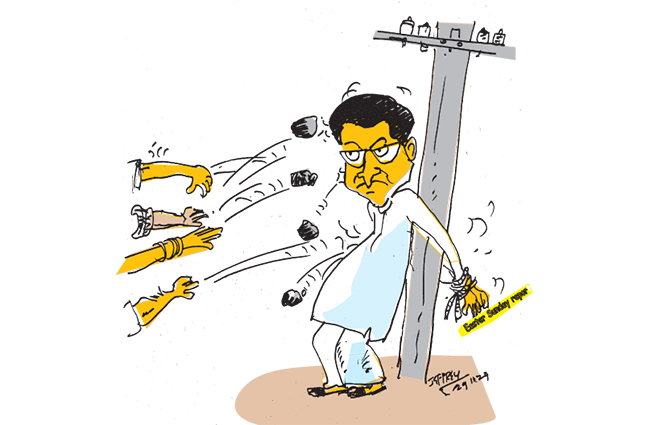
By Dr Upul Wijayawardhana
When I wrote “Will SL govt. do better than the UK Labour administration?” (The Island, 18 October), I never imagined that there would be the need for a follow-up anytime soon but, as it happens, a downward spiral seems to have started already and cracks are appearing in the new administration of Sri Lanka. On top of the fracas about the Easter Sunday bomb attack probes, the pretty mask of the NPP, which won votes from even those sceptical about the JVP, seems to be coming off revealing the real JVP underneath.
Many who supported Anura Kumara Dissanayake (AKD) to win the presidency, in the belief that he was a true democrat committed to changing the political culture of Sri Lanka, would have been surprised and felt let down when AKD said at a public rally that there was no need for an Opposition and Parliament should be filled with only NPP members. For sceptics, that call came as no surprise at all, as the JVP is showing its true colours as a Marxist party. Afterall, they believe in the dictatorship of the proletariat!
Worse still is the fracas about the two committees set up by the then President Ranil Wickremesinghe to investigate two aspects of the Easter Sunday bomb attacks. The reports have cast doubts about the judgement of the president and his two ministers responsible for appointing to high positions two retired senior police officers, who are found to have neglected their duties by one of the committees. These two police officers—one arrested last October after crashing his jeep on to a tourist bus and a car, presumably due to inebriation and the other exposed by Ranjan Ramanayake’s audio recordings of telephone conversations—actively campaigned for the NPP.
We do not know what motivated them to play such a prominent role in the AKD presidential campaign; maybe it was because they were convinced by the policies of AKD or maybe they joined the winning side to get into positions of power or may be even avoid being charged with dereliction of duty while they were in the CID. Whatever it is, they got more than adequately rewarded and seem well protected as Minister Vijitha Herath has declared that they would not be removed under any circumstances. His skewed logic is well exposed and heavily criticized in the editorial “Probe reports, skewed logic and emerging threats” (The Island, 24 October)
Salvos fired by the veteran politician, Udaya Gammanpila, and the awkward responses, not only from the government but also from the Catholic Church are well analysed in two previous Island editorials; ‘Mastermind at large; Udaya in crosshairs’ on 21st October and ‘Of that damning report’ on 22nd October. Gammanpila claimed that he was in possession of two reports; one headed by former Justice S. A. Imam, who was tasked with probing some allegations UK Channel-4 levelled against Sri Lanka’s military intelligence in respect of the Easter Sunday carnage and the other, chaired by former judge A. N. J. de Alwis, whose purview was to inquire into intelligence coordination and investigative processes related to the Easter Sunday bombings. Gammanpila challenged the government to release these reports and Minister Herath threw a counter-challenge and issued a veiled threat of legal action.
When Gammanpila released the Alwis committee report, as he said he would, on 21 October, Minister Herath’s response was that they rejected the report, which is puzzling. What one would have expected a government that came to power on the promises of transparency and elimination of corruption to publish the report in keeping with their demand whilst being in the Opposition. Interestingly, initially it was the spokesman of the Catholic church, Father C G Fernando, who gave the reason: that Justice Alwis had conflict of interest as her brother had been disciplined by the two police officers concerned and, subsequently Minister Herath carried out a personal attack on her. Why weren’t those objections raised, if valid, when she was appointed? And, why did her critics wait until they found the committee report was critical of their two favourite ex-cops! Is this good governance that was promised?
Gammanpila released the Imam report 28 October, and one wonders what Father Fernando, who lamented about the loss of that report at a book launch on 01 October, has got to say? Meanwhile, JVP supporters have mounted a massive social media campaign ridiculing Gammanpila. Perhaps, it is the shape of things to come!
Interestingly, at a ceremony held at one of the affected sites, St. Sebastian’s church in Katuwapitiya, conducted by Cardinal Ranjith, President AKD was questioned emotionally by a bereaved mother/wife what action the government was planning to take. His response was that as he was not a judicial officer, he would leave it to the judiciary to take action. As there is an element of doubt, for the sake of the promised transparency and eradication of corruption, he should get the Attorney General to file action against these two officers, as recommended in the Alwis report. If they are cleared by the judiciary, then they can resume their jobs. This would help prevent embarrassment for the government. It looks as if the new government is unaware of the dictum “Justice must not only be done, but must also be seen to be done”.
Then came the sudden issue of the US travel advisory. The government’s response that it had been aware of the threat and had already taken action, seemed an excuse. Had the government liaised with the foreign diplomats, a less damaging advisory could have been issued as the way they had been issued is likely to damage the tourist sector which is reviving. Of course, it is quite possible that this was done purposely, as it was issued the day after the government announced that it had signed the resolution, spearheaded by Chile, supporting the UN Secretary General who had been declared a persona non grata by Israel. If so, the government is heading for a very turbulent period engineered by foreign viceroys!
The credibility of the government is falling fast as they seem to be doing just the opposite of what its leaders preached while they were in the opposition.
-

 Business3 days ago
Business3 days agoStandard Chartered appoints Harini Jayaweera as Chief Compliance Officer
-
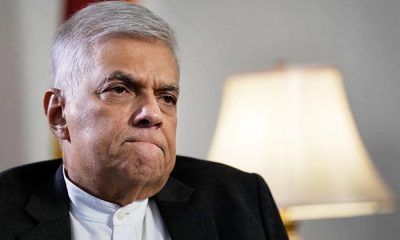
 News4 days ago
News4 days agoWickremesinghe defends former presidents’ privileges
-
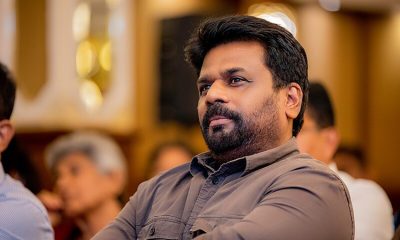
 Features7 days ago
Features7 days agoRestructuring education to align with global demands
-

 News2 days ago
News2 days agoFive-star hotels stop serving pork products
-
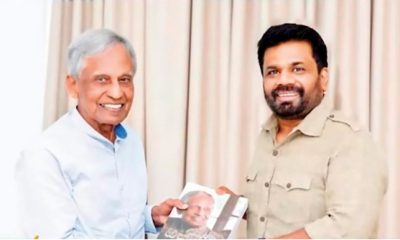
 Opinion4 days ago
Opinion4 days agoDevolution and Comrade Anura
-

 News2 days ago
News2 days agoFifteen heads of Sri Lanka missions overseas urgently recalled
-

 Sports4 days ago
Sports4 days agoChamika, Anuka shine as Mahanama beat Nalanda
-
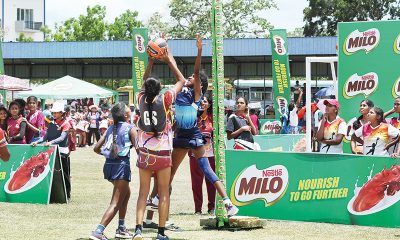
 Sports4 days ago
Sports4 days agoMilo powered Schools Netball finals from November 4











